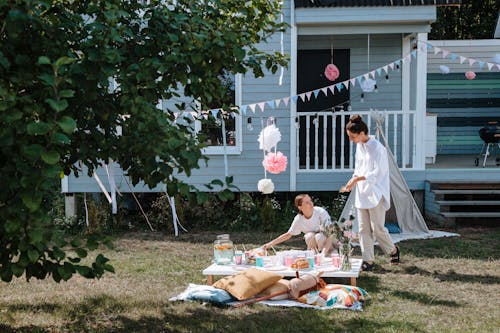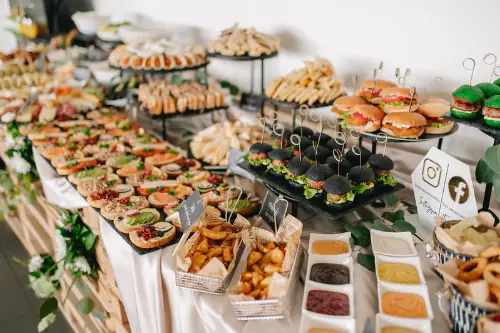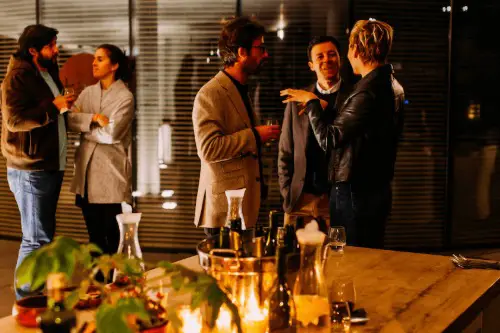1. Behind-the-Scenes Prep Is Anything But Effortless

What looks casual on the surface—fresh flowers, artfully plated appetizers, curated playlists—often hides hours of planning. The myth of “effortless” hosting pressures people to do everything in advance, so the event appears spontaneous. From vacuuming the couch cushions to chilling just the right wine, the buildup can feel like prepping for a stage production. Ironically, it demands more effort than traditional hosting.
Trying to make things look easy adds a layer of emotional labor. Hosts feel obligated to be relaxed even when they’re multitasking behind the scenes. It’s authenticity with a script—and it’s wearing people out. Simplicity, ironically, now comes with a checklist.
2. Styling for Social Media Kills Spontaneity

Effortless hosting thrives in aesthetics—clean counters, ambient lighting, perfectly imperfect tablescapes. But making a home look lived-in but photogenic requires meticulous staging. People aren’t just preparing dinner—they’re curating content. Hosting becomes a photoshoot in disguise.
This self-consciousness can drain joy from the process. Guests notice when they’re part of a set rather than a scene. The pressure to keep things “organic” and clickable robs the night of natural connection. You’re styling more than you’re smiling.
3. It Replaces Help with Performance

Traditional hosting often welcomed team effort—potlucks, shared cleanup, impromptu drink-mixing. Effortless hosting promotes a model where everything’s done by one person who appears relaxed. It turns hosting into a solo act rather than a shared experience. Asking for help now feels like breaking character.
This shift burdens hosts with invisible expectations. If the vibe drops, they blame themselves for not juggling it better. Hosting shouldn’t mean hiding stress behind a serene smile. Grace looks better when it’s real.
4. The Menu Isn’t as “Low-Key” as It Looks

What’s billed as “easy bites” usually involves hand-tied crostini, mini ramekins, and meticulously paired wine flights. Casual finger food now comes with artisanal expectations. Even “store-bought” needs clever plating and mood pairing to pass as stylish. Simplicity is dressed up with complexity.
Guests may never notice the brand of olive oil or the garnish ratio, but hosts obsess over every detail. It’s culinary minimalism masquerading as event planning. What used to be chips and dip is now a curated grazing board with thematic cohesion. “Relaxed” has been rebranded—and it’s exhausting.
5. Hosting Is No Longer Private

Effortless hosting often means sharing photos, posting stories, or recording the setup. What used to be a personal moment now comes with public performance. Hosts curate not just the dinner—but the narrative around it. Memories are made—and marketed.
That expectation can make hosting feel like content creation, not connection. You’re not just feeding friends—you’re maintaining a brand. The room isn’t just full—it’s always lit. And the spotlight rarely dims.
6. Emotional Expectations Are Sky-High

If the host doesn’t appear cool, collected, and joyful, the event feels “off.” This emotional pressure can outweigh logistics, making anxiety harder to spot and harder to share. You’re not allowed to be frazzled—even if you’re behind on timing or unsure of a guest’s dietary needs. Perfection is now emotional as well as visual.
People admire chill hosts, but rarely acknowledge how practiced that chill is. Holding the mood becomes part of the job. Hosting shouldn’t mean hosting your feelings away. Calm should be earned—not performed.
7. Logistics Still Matter—They’re Just Hidden

Effortless hosting doesn’t eliminate timing—it just disguises it. The candles don’t light themselves, the playlist doesn’t shuffle with emotional precision, and the wine doesn’t pour without knowing who drinks what. These invisible logistics take planning and foresight. Even spontaneity needs a spreadsheet.
The idea that you can “just host” if you choose the right vibe is misleading. Behind every organic laugh is a well-timed pour and a seat swap. Real hosting involves thoughtfulness—not just vibes. And that’s work, whether you admit it or not.
8. Guests Feel Pressured Too

When hosting looks flawless, guests may hesitate to be themselves. They worry about ruining the vibe, mismatching the aesthetic, or overstepping unspoken boundaries. It’s not just exhausting for the host—it subtly shapes behavior in the room. The atmosphere becomes fragile under the weight of perfection.
True ease comes from permission—not performance. Guests open up when the space allows real presence, not curated poses. If no one wants to spill the wine, relax the shoulders, or laugh too loudly—was it ever effortless at all? Casual should mean comfort, not choreography.
This post 8 Reasons “Effortless Hosting” Is Quietly Becoming the Most Exhausting Trend was first published on Greenhouse Black.
